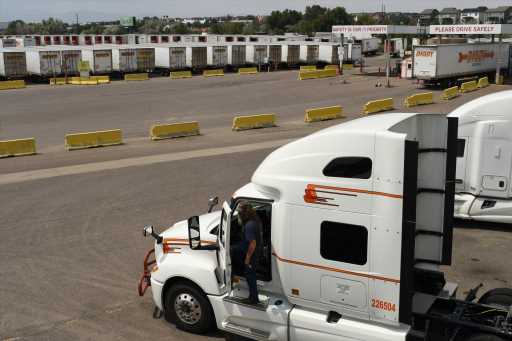The extended closure of Interstate 70 through Glenwood Canyon is the latest wrench in the gears of commerce for the trucking industry and the businesses that depend on it.
For people on Colorado’s West Slope, massive mud and rock slides could mean empty spots on store shelves as detours add hours to truck drivers’ routes. For trucking companies, the delays make keeping trucks rolling despite an ongoing driver shortage that much tougher.
“I think this is like the ninth ring of hell, Dante’s ninth ring of hell right now,” said Greg Fulton, president and CEO of the Colorado Motor Carriers Association.
The Colorado Department of Transportation is assessing the damage to I-70 from the debris and several feet of mud that cascaded down the canyon’s steep slopes during recent heavy monsoon rains. Little vegetation exists to stop the flows where the Grizzly Creek wildfire burned last year.
Gov. Jared Polis said Monday that I-70 reopen may not reopen for days or even weeks and when it does, traffic will likely be one lane in each direction.
To circumvent the closed road, commercial trucks drive north into Wyoming to use Interstate 80 or get off at Silverthorne and drive north to U.S. 40 and west before reconnecting with I-70 via Colorado 13 at Rifle.
“That adds anywhere from two-and-a-half to five hours, depending on the amount of traffic and things like that,” Fulton said of trucks going to western Colorado.
A lot of the fuel and food for the West Slope is shipped out of Denver, Fulton said. Drivers often do what’s called “a drop and hook.” The driver delivers a load in Grand Junction or other spots, picks up another load or an empty trailer and returns to Denver.
If I-70 is open that can be done in one day, but Fulton said the detour turns the trip into two days to allow for the driver’s required 10-hour rest period.
“You need more drivers and more equipment to service the same amount of needs. It costs more time. It costs more money and when you already have a driver shortage, it stretches things and makes things that much more difficult,” Fulton said. “That’s when you start to see fuel running out at gas stations, certain things not appearing on some of the store shelves.”
Regional and national shortages have been common during the pandemic. Factory closures and disruptions of the supply chain around the globe held up production and deliveries and the knots are still being worked out. The trucking industry didn’t have enough drivers before COVID-19 hit and the shortage has worsened as older drivers have retired.
“Due to the Glenwood Canyon road closure we are redirecting our trucks and currently anticipate a 5-6 hour delay in our deliveries,” King Soopers spokeswoman Jessica Trowbridge said in an email. “Our teams are monitoring the situation and are working diligently to get products to all impacted stores as quickly as possible.”
During the closure, CDOT is working with neighboring states to direct commercial traffic to I-80 in Wyoming, spokeswoman Elise Thatcher said in an email.
Thatcher said the daily number of commercial vehicles on I-70 varies, depending on the location. On average, 2,850 trucks travel daily on I-70 past Exit 87 at West Rifle, the main closure point on the west side and where the detour reconnects with I-70. Fewer trucks, on average, 2,080 per day, travel on I-70 past Exit 133 at Dotsero, the closure point on the east.
And an average of 4,900 commercial trucks drive past Exit 205 at Silverthorne, the exit for vehicles taking the northern detour.
Diane Schwenke, president and CEO of the Grand Junction Area Chamber of Commerce, said Tuesday that she hasn’t heard of any major problems for local businesses due to the closure.
Between fires and rock slides, closures of I-70 are nothing new.
“We’ve been able to get through it,” Schwenke said. “I’m sure we will this time around,”
But an extended closure will delay shipments to and from Grand Junction and require drivers to log more hours, which will drive up costs, Schwenke fears. Some of the area’s shipments, including supplies for restaurants, come from Salt Lake City, so those won’t be affected.
While she’s hopeful the highway won’t be closed for long, Schwenke said the damage and debris shown in a video shot by a CDOT drone was daunting.
“We have Peach Fest coming up in two weeks and we want to see a lot of visitors from the Front Range,” Schwenke said.
The Palisade Peach Festival is Aug. 20-21.
Source: Read Full Article
